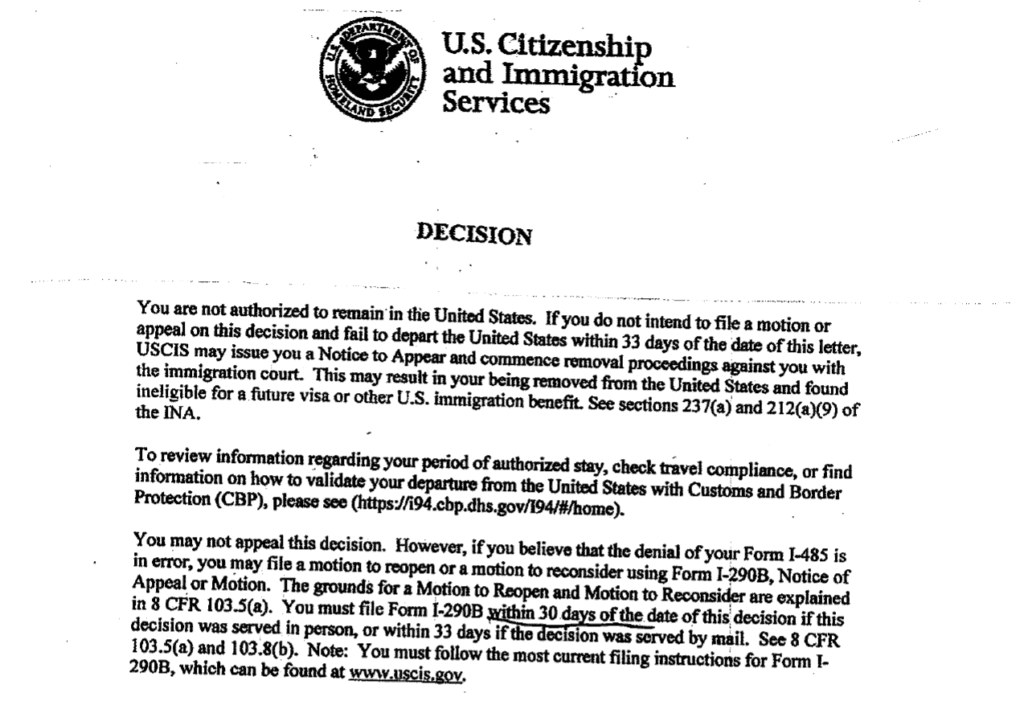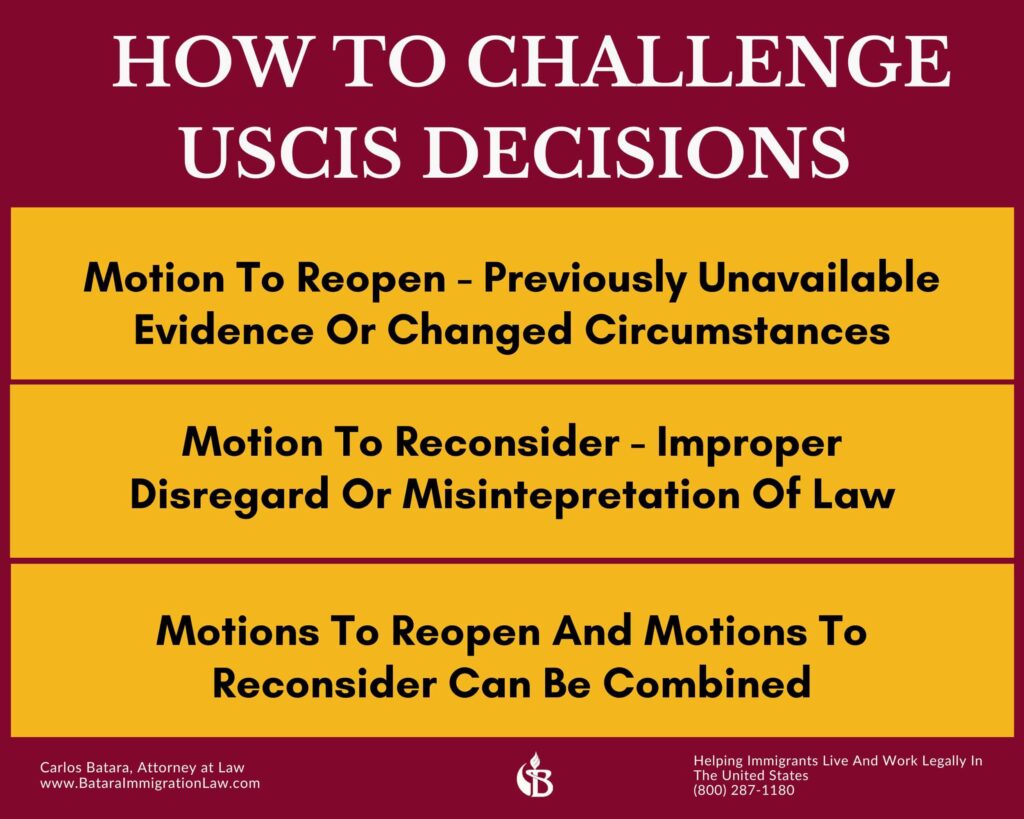
Not all green card marriage interviews have happy endings.
Sometimes immigrants lose, even those married to U.S. citizens.
In the process, they lose money. They lose time.
Worst of all, they face permanent separation. Their once sturdy marital union is now on the rocks.
However, many marriage green card denials can be overcome.
So long as couples do not lose hope and courage, so long as they do not fall victim to helpless despair, many adverse U.S. Citizenship and Immigration Services (USCIS) decisions can be reversed.
In this article, you will discover what options exist to preserve family unity in the aftermath of a denied marriage-based adjustment of status green card application.
More specifically, you will gain insights into two special USCIS motions: Form I-290B motions to reopen and Form I-290B motions to reconsider.

Table Of Contents
- Why Was Your Marriage-Based Permanent Residence Application Denied?
- How To Avoid I-485 Adjustment Of Status Denials In Advance
- What Options Exist When Your Application For A Green Card Marriage Is Denied?
- Option 1: Walk Away From Your Marriage Green Card Denial Without Taking Any Action
- Option 2: Regroup And Refile For Marriage Green Card Benefits
- Option 3: Challenging The Marriage Green Card Denial: USCIS I-290B Motions
- What Happens If Your USCIS I-290B Motions To Reopen Or Reconsider Are Denied?
- Conclusion
Why Was Your Marriage-Based Permanent Residence Application Denied?
Let’s start at the beginning. Why were your efforts to win a green card rebuffed?
The first step in effectively challenging a marriage green card decision is to figure out why your case was denied. Once the basis for the USCIS decision is known, options to appeal the outcome can be identified.
The most common pitfalls, as explained in Green Cards Through Marriage: Eight Mistakes To Avoid, include:
- The marriage is not bona fide
- The marriage is not legal
- Living in the U.S. without lawful status
- Criminal convictions
- Inability to meet financial requirements
- Incomplete application details
- Insufficient supporting evidence
- Poor interview preparation
As this short list of potential problems point out, it is critical for couples to avoid trivailizing the complexity of the green card marriage process.
How To Avoid I-485 Adjustment Of Status Denials In Advance
In most cases, USCIS will not not simply deny your I-485 application to adjust status to permanent residence.
Rather, you will be sent a Request For Evidence. If you fail to respond or if your response is deemed inadequate, the government will then serve you with a decision outlining the reasons it has found your green card application defective.
This means many immigrants and their U.S. spouses have an opportunity to avoid a marriage green card denial before the adverse decision is issued.
At this stage, corrective actions can be taken.
The government rarely catches couples completely off-guard.
In my experience as a permanent residence lawyer, I’ve learned that far often the failure to correct application shortcomings occur when married couples have handled their cases on their own, or with the assistance of a family member, paralegal, or notario.
In other words, many marriage green card denials are not inevitable.
Because the RFE specifies the concerns of immigration authorities about the paperwork you have submitted, experienced immigration counsel can usually guide you and your spouse successfully past this stage of your green card application process.
When the outcome of your immigration case is at stake, an ounce of prevention is worth a pound of cure. Don’t take the task of responding to the RFE lightly. Seek professional assistance if possible.
Moreover, the success of using one of the two USCIS motions discussed in this article quite often depends on the framework you establish in your response to the request for evidence.
What Options Exist When Your Application For A Green Card Marriage Is Denied?
In most battles, combatants have two choices: fight or flight.
Immigration law is no different.
When an adjustment of status to permanent resident application is denied, U.S. citizens and their immigrant spouses have three options.
- They can walk away without taking any actions
- They can file a new I-485 marriage green card application
- They can challenge the decision with a Form I-290B USCIS motion to reopen or a Form I-290B USCIS motion to reconsider
Let’s explore these approaches one at a time.
Option 1:
Walk Away From Your Marriage Green Card Denial Without Taking Any Action
Do nothing more. Accept the denial. For now.
Say what?
Walk away without fighting back?
Yes, sometimes the most prudent course of action is to do nothing.
You’re probably wondering, why would a husband and wife walk away from a failed effort to procure permanent resident status?
In short, when the marriage green card application should not have been filed in the first place. It was doomed from the outset.
This usually happens when couples have been the victim of professional incompetence or have tried to handle their case on their own and made a glaring error.
(This also applies to those individuals who commit immigration fraud, but I assume, since you have taken the time to read this post, you are not the type of scurrilous character who thinks they can game the immigration system.)
I’ve seen too many cases where flawed legal advice has led couples down the wrong path.
In these instances neither a Form I-290B motion to reopen nor a Form I-290B motion to reconsider will help the green card applicant.
The immigrant spouse was not eligible to seek adjustment of status via an interview at a local USCIS office – and whomever was responsible for the misguided submission of the green card application should have known better.
Adjustment Of Status vs Consular Processing
If you are an immigrant living in the U.S., permanent residence green cards are obtained in two different ways: either at an adjustment of status interview at a local USCIS district office or by the issuance of an immigrant visa at a United States consulate or embassy abroad.
For almost all immigrants, remaining in the U.S. and being interviewed at a local office is the preferred option. Yet, for some, adjustment of status is not possible. They must seek their green cards through consular processing.
If you’re married to a U.S. citizen, and your entry was lawful, you might qualify for a marriage-based green card through adjustment of status.
On the other hand, if you’re married to a U.S. citizen, but you entered the U.S. without inspection, then you’ll likely need to attend your permanent residence interview in your home country.
There are a few exceptions to these rules, but which option best suits your immigration history should be discernible by the person selected to help lead you and your spouse through the green card maze.
If you proceed to seek permanent residence abroad via consular processing, utililzing a Form I-290B motion to reopen or Form I-290B motion to reconsider to fight a negative decision will not be applicable.
Here are other easily recognizable red flag situations warranting caution:
- The immigrant spouse (i.e., the beneficiary of the permanent residence application) has been convicted of certain criminal offenses
- The immigrant spouse has a communicable disease, a mental illness, or a history of drug abuse
On the whole, as I’ve learned in my immigration appeals practice, faulty legal advice most often arises in regards to the twin culprits of a spouse’s illegal entry and unlawful presence in the United States.
These issues are not always apparent at first blush.
- For instance, perhaps the immigrant spouse entered the country on a tourist visa, but he or she planned all along to get married and remain living in the U.S. Because of the false intent – the false claim of seeking a visa as a temporary visitor – the entry is classified as visa fraud.
- Or maybe the immigrant spouse entered the U.S. several years ago on a K-1 fiancé visa filed by a different person, but they never married. He or she overstayed. The immigrant spouse does not qualify to seek adjustment of status through marriage to a subsequent husband or wife.
Yet, as noted above, in many cases the issues of illegal entry and unlawful presence are easy to spot.
- Having entered without permission, the immigrant spouse will usually not be eligible to apply for a green card inside the United States. Instead, he or she has to seek a green card through consular processing and attend an interview at the U.S. embassy in his or her home country. Frequently, this means he or she will need to apply for a difficult-to-win I-601 family unity waiver in order to obtain government permission to be allowed to re-enter the U.S. after the interview.
In these situations, it is generally better to let sleeping dogs lie.

You cannot attack these situations directly.
Neither filing a new permanent residence application nor challenging the USCIS decision with a Form I-290B motion to reopen or a Form I-290B motion to reconsider is likely to succeed.
But walking away from your denied marriage green card application does not mean you should simply do absolutely nothing.
Instead, you need to move into “Plan B” mode.
Soon after the decision to deny your case is issued, you could be served with a Notice To Appear at Immigration Court. This means the government wants to remove you from the United States.
There are steps you can take to protect yourself from potential deportation charges. They do not include filing either a new application for permanent residency benefits or a motion to challenge the USCIS green card denial.
If you’ve been the unsuspecting victim of immigrant fraud, you should start to prepare your evidence to show how you were duped. If you have convictions, you should consult with a criminal defense attorney to ascertain if you file a post-conviction to vacate or dismiss your offenses. If your previous spouse abused you, you should talk to an immigration specialist who handles domestic violence relief claims.
In fact, there are several other options that might fit your specific circumstances.
Again, by putting effort into finding competent counsel who can help you figure out what, if any, avenues you can legitimately pursue, you improve your chances to avoid deportation and separation from your U.S. citizen spouse.
Option 2:
Regroup And Refile For Marriage
Green Card Benefits
If USCIS rejects your application for adjustment of status, you will be mailed a written decision that provides the reason for the denial.
Most denials are made without prejudice. This means you can file a new application for permanent residence.
This may be your best course of action if the problems which caused your marriage-based green card application to be denied can be cleared up before refiling.

For example, Robbie, a U.S. citizen, and Yvonne, a couple in their late 20s, visited my San Bernardino immigration law office shortly after their adjustment of status application was denied.
Yvonne had entered lawfully as a teenager on a tourist visa. She remained in the U.S. with her aunt. She had no convictions and she worked as a caregiver. They had met at a community event while Robbie was serving at a nearby military base.
Over the course of the next few years, their grew closer together and decided to marry even though Yvonne’s live-in responsibilities prevented them from living together 5 of 7 days per week.
Robbie had been reassigned to a new base about 75 miles away. Once he completed his tour of duty, he planned to move closer to Yvonne’s work location and enroll at the local college.
The government doubted the legitimacy of their marriage due not only to their unusual living situation, but also to their lack of joint expenses.
Aside from such shortcomings, their application could have been granted. Yvonne’s case was not marred by unsurmountable complications, such as criminal convictions, medical issues, illegal entry, and visa fraud.
As in many of these types of situations, Yvonne and Robbie had used the services of an immigration assistance office. The I-485 paperwork was technically correct. The packet of information to substantiate the marriage was woefully inadequate.
Because they had the opportunity to submit such supporting documents in their earlier application, but failed to do so, filing a USCIS motion to reopen their case based on new facts would most likely fall short.
Reapplying for permanent residency benefits was the best option for them. It required fixing the holes in their evidence. It required better preparation.
Option 3:
Challenging The Marriage Green Card Denial: USCIS I-290B Motions
When should you directly challenge the USCIS decision with a I-290B motion to reopen or a I-290B motion to reconsider its denial?
Simply stated, when you believe the immigration officer has made a error.
There are two classes of common USCIS mistakes, factual and legal. Both types of challenges begin with the filing of Form I-290B.
- A USCIS motion to reopen asks that the decision be reevaluated based on the discovery of new evidence or changed circumstances.
- A USCIS motion to reconsider asks that the decision be reexamined based on the improper disregard or misinterpretation of applicable law.
Other times a factual mistake is combined with a legal error. In such instances, a motion to reopen can be combined with a motion to reconsider.

What Happens If Your USCIS I-290B Motions To Reopen Or Reconsider Are Denied?
If your motion to reopen or reconsider is denied, you will likely be served with an Notice To Appear at Immigration Court to begin removal proceedings.
This is not the time to give up.
The immigration judge will ask what forms of relief you plan to present.
Depending on your individual circumstances, you might be able to renew your permanent residence application, this time to be adjudicated by the judge.
To the extent your green card marriage was denied by USCIS due to deficient preparation, this should be your first option.
(This assumes, as discussed earlier, you are not prohibited due to blemishes such as criminal offenses, commission of fraud, or other statutory disqualifications.)
Winning a marriage-based green card at immigration court is more difficult than winning a grant of permanent residence at an adjustment of status interview. The judge will look at your case in greater depth than a USCIS officer.
Both you and your U.S. citizen spouse will be asked to testify. You will be cross-examined by a government attorney. The judge, too, may also ask questions.
On the plus side, you can present witnesses who can give live supporting testimony about your marriage. In addition, you can supplement the evidence you provided with the I-485 application with new documents.
(Editor’s Note: Do not confuse Immigration Court motions to reopen and reconsider with USCIS motions to reopen and reconsider. Although the technical grounds for the motions are similar in both types of proceedings, the procedural rules differ. In short, the court rules at the conclusion of deportation court hearings have different parameters from green card-related I-290B motions to reopen and reconsider.)
Conclusion
Denials of marriage-based green card applications are not uncommon.
Despite the common belief that adjustment of status through marriage to a U.S. citizen is the surest path to permanent residence, denials happen far more frequently than many immigrants suspect.
Over the past four years, the rejection rate for all immigration applications has steadily risen. Marriage-based green card denials constitute nearly 50% of this total.
Many USCIS denials can be countered with either a new application, properly prepared, or I-290B motions to reopen or I-290B motions to reconsider due to government miscues.
Other times, the battle spills over to immigration court.
In both situations, seeking professional assistance is in your best interests.
With the stakes so high – win or go home – challenging a denied marriage green card application is too risky to fight alone.
So don’t try it.




